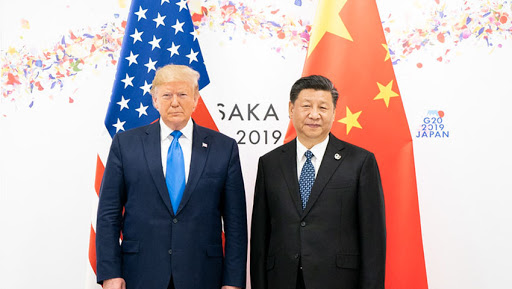President Donald Trump’s foreign policy legacy could be tarnished by a second push for his impeachment in response to a violent confrontation in Capitol Hill.
To continue reading the rest of this article, please log in.
Create free account to get unlimited news articles and more!
Last week, a pro-Trump rally contesting the outcome of the 2020 presidential election ended in tragedy after suspected supporters of the outgoing president stormed the Capitol Building in a bid to disrupt a joint-sitting of Congress, in which electoral college votes were formally counted.
The violent invasion of the Capitol Building resulted in the deaths of four rioters and a police officer, with many others injured.
Despite condemning the violence, President Trump was accused of inciting the riot, with his political opponents claiming he fuelled tensions in his address to supporters attending the rally.
This sentiment was shared by social media giants, which were quick to ban or restrict the 45th president’s access to their platforms.
Democrats are now threatening to file impeachment proceedings against President Trump for the second time.
If successful, this latest push threatens to tarnish the Trump administration’s policy legacy, which may be painted as a controversial, personality-driven blip in US political history.
There’s much to explore when examining the Trump administration’s policy record, but one of the more notable hallmarks of the Trump presidency has been the shift in US foreign policy, particularly relations with China.
What’s at stake?
President Trump has reshaped US foreign policy during his term in office, with the multilateral, Wilsonian policies of his modern predecessors making way for an ‘America first’ agenda, underpinned by economic nationalism and scepticism of global institutions.
These deviations have largely been brought to the fore by a deterioration in US-China relations.
President Trump has disrupted trade norms through the imposition of hefty tariffs on Chinese imports, repeatedly criticised Beijing’s heavy-handedness towards minorities and regional neighbours, and has condemned the regime’s suspicious handling of the COVID-19 outbreak, which he claimed the World Health Organisation helped cover up.
Most recently, the Trump administration has undermined the ‘One China’ policy, extending support to Hong Kong and Taiwan.
Just last week, the administration scrapped long-standing restrictions introduced to regulate relations between the US and Taiwan by limiting interactions between diplomatic officials from the respective nations.
“Taiwan is a vibrant democracy and reliable partner of the United States, and yet for several decades the State Department has created complex internal restrictions to regulate our diplomats, servicemembers, and other officials’ interactions with their Taiwanese counterparts,” US Secretary of State Mike Pompeo said.
“The United States government took these actions unilaterally, in an attempt to appease the Communist regime in Beijing. No more.”
Secretary Pompeo added, “[This] statement recognises that the US-Taiwan relationship need not, and should not, be shackled by self-imposed restrictions of our permanent bureaucracy.”
This latest move followed the Defense Security Cooperation Agency’s (DSCA) approval of almost $2.7 billion in arms to Taiwan in late 2020.
While viewed by many as a risk to international stability, the Trump administration’s vocal condemnation of the CCP has prompted observers to re-examine the benefits of a rising China.
In challenging Beijing, President Trump has emboldened allies, including Australia, which have called out Chinese encroachments on national sovereignty.
Such allies may feel isolated in a post-Trump milieu, in which the outgoing administration is blamed for the escalation in tensions between the West and China.
China, on the other hand, may be characterised as the victim of a rogue, disgraced president, with a personal vendetta against the regime, fuelled by so called conspiracy theories.
This may seem farfetched, but this narrative is championed by President Trump’s domestic opponents, who are set to assume control of the White House and both houses of Congress.
But the Democrats, and anti-Trump Republicans for that matter, will be swimming against a tide of over 74 million Americans who endorsed President Trump’s policy agenda in the 2020 election.
Discarding President Trump’s legacy won’t be easy — his confrontations with Beijing have exposed the CCP’s darker underbelly, with the regime stopping at nothing to quell growing dissent both internally and internationally.
While harming his own legacy, President Trump has dealt an enduring blow to the communist regime, which an incoming Biden administration would do well to exploit.
Get involved with the discussion and let us know your thoughts on Australia's future role and position in the Indo-Pacific region and what you would like to see from Australia's political leaders in terms of partisan and bipartisan agenda setting in the comments section below, or get in touch with
[Related: Will Biden ‘reset’ relations with China?]
Charbel Kadib
News Editor – Defence and Security, Momentum Media
Prior to joining the defence and aerospace team in 2020, Charbel was news editor of The Adviser and Mortgage Business, where he covered developments in the banking and financial services sector for three years. Charbel has a keen interest in geopolitics and international relations, graduating from the University of Notre Dame with a double major in politics and journalism. Charbel has also completed internships with The Australian Department of Communications and the Arts and public relations agency Fifty Acres.

 Login
Login








